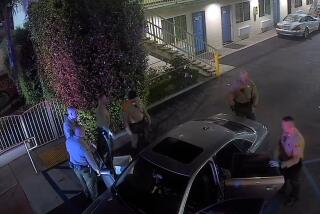Court Overturns Ex-Marshal’s Bribery Conviction
- Share via
SAN FRANCISCO — The bribery conviction of a former U.S. deputy marshal from Orange County was overturned Monday by a federal appeals court because the jury received improper instructions.
Joseph Gieniec was convicted in 1989 of accepting money and gifts from the owner of a private security firm that held a contract to assist the Marshal’s Service in seizing and guarding assets.
Gieniec had the authority to award the contract.
The U.S. 9th Circuit Court of Appeals overturned the bribery conviction based on improper jury instructions.
“This sounds like the kind of case we would retry,” said Doug Tillett, spokesman for the Justice Department’s Public Integrity Branch in Washington. But he added that the department has not yet seen a copy of the ruling.
Gieniec was accused of accepting $3,000 from Joseph Rydzewski, owner of Lyons Security, to pay for Gieniec’s vacation. Rydzewski also allegedly made Gieniec’s mortgage payments while Gieniec was vacationing.
Prosecutors contended that Rydzewski also made other loans and cash payments to Gieniec, provided guards for the ex-marshal’s home and paid for a lawyer in an unrelated matter.
Rydzewski said Gieniec threatened to cut off the contract unless the payments were made.
Gieniec claimed that the two were close friends and that he assumed Rydzewski did the favors out of friendship.
The appeals court ruled that it was improper for the trial judge to tell jurors that they could conclude Gieniec knew of Rydzewski’s illicit intent if “you find beyond a reasonable doubt that the defendant was aware of a high probability that the thing of value was provided for an unlawful purpose and he deliberately avoided learning the truth.”
The court said that instruction is only proper when a defendant claims a lack of guilty knowledge and the evidence at the trial supports a suggestion of deliberate ignorance.
“Gieniec made explicit demands for money and threatened Rydzewski that he would take the marshal’s contract away,” the court noted.
“There is no evidence suggesting a middle ground of conscious avoidance,” the court wrote.
Although there was a good deal of evidence that Gieniec knew he was being bribed, the evidence was not “so overwhelming as to compel a guilty verdict,” wrote the three-judge panel.
More to Read
Sign up for Essential California
The most important California stories and recommendations in your inbox every morning.
You may occasionally receive promotional content from the Los Angeles Times.













